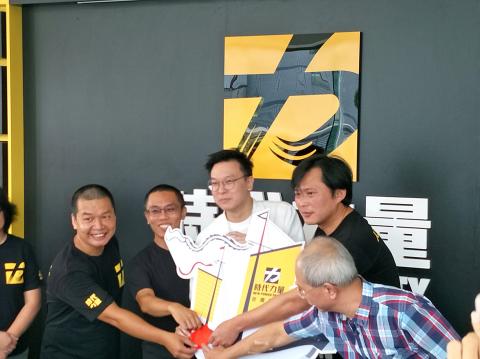Sunflower movement leader Lin Fei-fan (林飛帆) yesterday made taunting remarks about the Democratic Progressive Party (DPP), drawing criticism from DPP politicians.
“One party could win the Tainan mayoral election next year even if its candidate is a watermelon,” Lin said, commenting on the city’s established political landscape.
Tainan is regarded as a DPP stronghold; its mayor, William Lai (賴清德) of the DPP, in 2014 won a second term by a landslide and is slated to step down next year after eight years at the helm.

Photo: Chiu Hao-tang, Taipei Times
Several DPP lawmakers from Tainan constituencies have expressed their intentions to run in next year’s mayoral election.
Speaking yesterday at the opening of the New Power Party’s (NPP) Tainan headquarters, Lin said: “As people in Tainan are unusually conservative in politics, the DPP could win the mayoral election next year even if it promotes a watermelon as its candidate.”
As for the Chinese Nationalist Party (KMT), its members could do no more than teach Hoklo language (commonly known as Taiwanese) or don traditional costumes, which was “really upsetting,” Lin said in a jab at KMT Tainan City Councilor Hsieh Lung-chieh (謝龍介).
DPP Legislator Huang Wei-cher (黃偉哲) said that Lin’s comments were contemptuous and humiliating to Tainan residents.
The party’s procedure for primaries in the run-up to the mayoral election is strict, he added, questioning whether the NPP’s candidate selection would not be achieved through backroom deals.
Lai said Tainan was also dubbed a "holy land for democracy" and this reputation was the result of hard work by many of his political predecessors, which the younger generations should respect.
DPP lawmakers Yeh Yi-chin (葉宜津) and Lin Chun-hsien (林俊憲) also said support for the DPP’s ideals in Tainan was a result of the collective hard work put in by “democracy fighters.”
Former deputy Tainan mayor Yen Chun-tso (顏純左), now director of the DPP’s Tainan chapter, said he hoped Lin Fei-fan’s comments were nothing more than a slip of the tongue.
Netizens were not so lenient toward Lin Fei-fan’s remarks, with some writing that "social movements were like stepping stones for Lin," while others said Lin himself could be described as a cucumber — delicate and fragile.

Alain Robert, known as the "French Spider-Man," praised Alex Honnold as exceptionally well-prepared after the US climber completed a free solo ascent of Taipei 101 yesterday. Robert said Honnold's ascent of the 508m-tall skyscraper in just more than one-and-a-half hours without using safety ropes or equipment was a remarkable achievement. "This is my life," he said in an interview conducted in French, adding that he liked the feeling of being "on the edge of danger." The 63-year-old Frenchman climbed Taipei 101 using ropes in December 2004, taking about four hours to reach the top. On a one-to-10 scale of difficulty, Robert said Taipei 101

Nipah virus infection is to be officially listed as a category 5 notifiable infectious disease in Taiwan in March, while clinical treatment guidelines are being formulated, the Centers for Disease Control (CDC) said yesterday. With Nipah infections being reported in other countries and considering its relatively high fatality rate, the centers on Jan. 16 announced that it would be listed as a notifiable infectious disease to bolster the nation’s systematic early warning system and increase public awareness, the CDC said. Bangladesh reported four fatal cases last year in separate districts, with three linked to raw date palm sap consumption, CDC Epidemic Intelligence

US climber Alex Honnold left Taiwan this morning a day after completing a free-solo ascent of Taipei 101, a feat that drew cheers from onlookers and gained widespread international attention. Honnold yesterday scaled the 101-story skyscraper without a rope or safety harness. The climb — the highest urban free-solo ascent ever attempted — took just more than 90 minutes and was streamed live on Netflix. It was covered by major international news outlets including CNN, the New York Times, the Guardian and the Wall Street Journal. As Honnold prepared to leave Taiwan today, he attracted a crowd when he and his wife, Sanni,

Taiwanese and US defense groups are collaborating to introduce deployable, semi-autonomous manufacturing systems for drones and components in a boost to the nation’s supply chain resilience. Taiwan’s G-Tech Optroelectronics Corp subsidiary GTOC and the US’ Aerkomm Inc on Friday announced an agreement with fellow US-based Firestorm Lab to adopt the latter’s xCell, a technology featuring 3D printers fitted in 6.1m container units. The systems enable aerial platforms and parts to be produced in high volumes from dispersed nodes capable of rapid redeployment, to minimize the risk of enemy strikes and to meet field requirements, they said. Firestorm chief technology officer Ian Muceus said